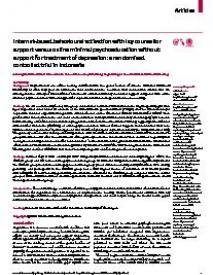Internet-based behavioural activation with lay counsellor support versus online minimal psychoeducation without support for treatment of depression : a randomised controlled trial in Indonesia
Summary
Background
Depression is one of the leading contributors to the global burden of disease. However, treatment availability is often very poor in low-income and middle-income countries. In a randomised clinical trial, we investigated the efficacy of internet-based behavioural activation with lay counsellor support compared with online minimal psychoeducation without support for depression in Indonesia (a middle-income country).
Methods
We did a community-based, two-group, randomised controlled trial in Indonesia. Eligible participants were aged 16 years or older, scored 10 or above on the Patient Health Questionnaire 9 (PHQ-9), met the criteria for major depressive disorder or persistent depressive disorder based on the Structured Clinical Interview for DSM-5, were proficient in Bahasa Indonesia, and could use the internet. Participants were randomly allocated (1:1) by a research assistant using a web-based randomisation program to online behavioural activation with lay support (termed Guided Act and Feel Indonesia [GAF-ID]) or online psychoeducation without further support. Randomisation was done within a random permuted block design and was stratified by sex and depression severity (ie, PHQ-9 10–14 vs ≥15). The primary outcome was self-reported PHQ-9 score at 10 weeks from baseline. Research assistants were masked to group allocation until after the assessment of the primary outcome. Interventions were described to participants during the consent procedure and after randomisation, but no indication was given as to which was the intervention of interest and which was the control. Analysis was by intention to treat. The trial was registered in the Netherlands Trial Register, number NTR5920. It is closed to new particpants, and follow-up has been completed.
Findings
Between Sept 6, 2016, and May 1, 2017, 313 participants were enrolled and randomly assigned, 159 to the GAF-ID group and 154 to the online psychoeducation group. At 10 weeks, PHQ-9 scores were significantly lower in the GAF-ID group than in the online psychoeducation group (mean difference –1·26 points [95% CI –2·29 to –0·23]; p=0·017), and participants in the GAF-ID group had a 50% higher chance of remission at 10 weeks (relative risk 1·50 [95% CI 1·19 to 1·88]; p<0·0001). An effect size of 0·24 for the GAF-ID group compared with the control group at 10 weeks was sustained over time (effect size 0·24 at 3 months, and 0·27 at 6 months). No adverse events were reported in either group.
Interpretation
To our knowledge, ours is the first adequately powered randomised clinical trial of an internet-based intervention for depression in a low-income or middle-income country. Online behavioural activation with lay counsellor support efficaciously reduced symptoms of depression, and could help to bridge the mental health gap in low-income and middle-income countries.
Geachte bezoeker,
De informatie die u nu opvraagt, kan door psychotraumanet niet aan u worden getoond. Dit kan verschillende redenen hebben,
waarvan (bescherming van het) auteursrecht de meeste voorkomende is. Wanneer het mogelijk is om u door te verwijzen naar de bron
van deze informatie, dan ziet u hier onder een link naar die plek.
Als er geen link staat, kunt u contact opnemen met de bibliotheek,
die u verder op weg kan helpen.
Met vriendelijke groet,
Het psychotraumanet-team.
In: The Lancet Psychiatry, ISSN 2215-0366 | 5 | 9 | September | 707-716,
https://doi.org/10.1016/S2215-0366(18)30223-2
Available online 11 July 2018


